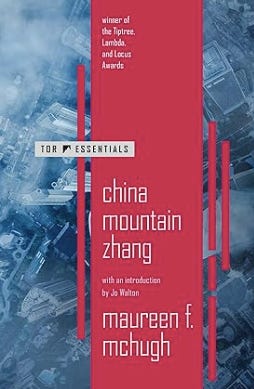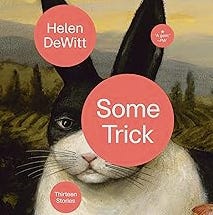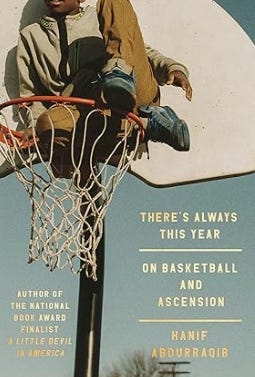I’ve always been a big reader. That’s what you get when you’re an only child and you don’t know about video games or television. Either you read or you die of loneliness (not that the two are mutually exclusive).
There’s much to celebrate in recent news, but it has also been a lot. I figured everyone could use suggestions on escapism more than another think piece, so here are the best books I read in last six months. (I am sure you know this, but I am not any kind of influencer, so I do not get anything for making these recommendations.)
Novels
I was absolutely devastated by The City and the Pillar (1948), Gore Vidal’s coming-of-age novel about a man who has long been in love with his male best friend. The book is beautifully written; the ending may kill you.
I don’t usually listen to audiobooks. But when I finally got COVID this spring, I couldn’t focus on much, so I listened to Elle Fanning reading Margo’s Got Money Troubles (2023), the story of a young woman who becomes pregnant by her English professor, keeps the baby, and starts an OnlyFans account while her former-pro-wrestler dad babysits. That probably sounds depressing. It’s not. I lol’ed a lot.
In Cassandra at the Wedding (1962), college-age twin women reunite at their family home. One of them is getting married, and the other is going off the rails. I can’t promise you’ll like this book—it’s probably the most specific recommendation on this list—but I enjoyed the complicated Cassandra character (and I have a lot of questions about her therapist’s approach to boundaries).
I love the work of Emily Austin, who wrote Interesting Facts About Space (2024). The book is mostly not about space; it follows a young IT professional who worries she may be a terrible person. The writing is sensitive and hilarious, just like the writing in Austin’s earlier book, Everyone in this Room Will Someday Be Dead.




Feminism
This year, I wanted to read some feminist classics that I’d somehow never read. One of these, bell hooks’s The Will to Change: Men, Masculinity, and Love (2004), is the best work I’ve read about how the patriarchy harms men and how men are essential allies in the feminist struggle.
In The Tragedy of Heterosexuality (2020), Jane Ward explores how heterosexual norms have harmed both men and women, how the self-help industry reinforces those norms, and what we can do about all this. The author has a great voice.
Wifework: What Marriage Really Means for Women (2011), surveys research on the burdens that wifehood imposes on women. The author, Susan Maushart, intersperses this research with narrative about her own experiences. I loved Maushart’s voice, too—it was funny and direct.
The Second Shift (1989, updated with new data in 2012) is another one of my overlooked classics. In it, Arlie Russell Hochschild and Anne Machung explore the double burden that employed mothers face, relying on original interviews of dozens of families. Fair warning that this does read more like an academic text than a typical popular book.




Speculative Fiction
I wasn’t sure I was going to like China Mountain Zhang (1992) because I don’t usually go in for mosaic novels. But I really enjoyed the development of the main character in this work imagining what life would look like if China became the dominant world power after the collapse of the United States and subsequent socialist revolution. This novel was Maureen McHugh’s debut and it won basically all the available sci fi awards.
Piranesi (2020) was another big award winner. It’s a quick read; probably the second-closest thing to a beach read on this list. It is part murder mystery; part story of a man who has long lived inside an enormous, ever-shifting parthenon; and part exploration of other dimensions.
Nana Kwame Adjei-Brenyah’s Chain-Gang All-Stars (2023) also won a lot of awards. It imagines a prison system only slightly more dystopian than our own: incarcerated individuals can (theoretically) earn their freedom by participating in a reality TV show in which they fight each other to the death. The author somehow makes this parable very funny, while never letting us off the hook.
Sleep and the Soul (2023) is Greg Egan’s latest collection of sci fi short stories. It’s not his best collection—I’d read Axiomatic or Oceanic first if you’re new to Egan—but I will never not absolutely love his work. Like all short story collections, this one had better and worse stories; I preferred those in the second half of the book.




Miscellaneous
Benjamin Labatut’s When We Cease to Understand the World (2022) tells the stories of some famous mathematicians and scientists whose brilliance descended into madness. The first story in the collection is nonfiction, the last is almost entirely fictional, and those in between are a mix—as if the book itself is progressing from absolute intellectual clarity to confusion. The writing/translation is beautiful.
I love Helen DeWitt. Her collection of short stories, Some Trick (2018), isn’t her best work—I’d start with The Last Samurai (no connection to the Tom Cruise movie). But some of the stories in this volume were really wonderful and DeWitt’s almost absurd level of intelligence was on full display.
I don’t usually go in for celebrity memoirs, but I read child star Jeanette McCurdy’s I’m Glad My Mom Died (2022) for book club and loved it. McCurdy talks about her family’s profound emotional abuse with clarity and (somehow) a lot of humor.
Hanif Abdurraqib routinely manages to capture my attention when writing on subjects I otherwise have no interest in. His latest collection of essays, There’s Always This Year (2024), is nominally about basketball, but really it’s about the bigger questions of what “making it” means, why we celebrate certain people, and whether we should have heroes at all.




Other things that interested me recently:
Chainsaws were invented for childbirth?!?
I recently learned that a French aristocrat said, upon hearing his death warrant read loud: “I see that you have made three spelling mistakes.” These were his last words.
With all the great jokes online about JD Vance’s anti-cat lady stance, I revisited a fabulous New Yorker article from January this year about witches, aka the original cat ladies.
I have been doing some volunteer work with Ukrainians, and I am trying to help a woman there recover after a bombing of her apartment. If you are so inclined, I know she would love your support, even if it’s a very small amount. And please share if you feel so inclined!





Oh, great - now my stack of unreads just grew another 20% :)
But truly, thanks for sharing - excellent post.